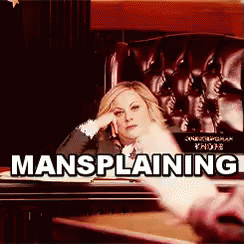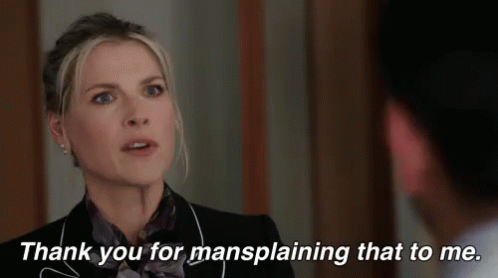What Does Mansplaining Mean?
The term mansplaining is a slang term that originated online more than a decade ago and has since gained popularity. It refers to the act of a man condescendingly or patronizingly explaining something to a woman because he believes that men are superior and women wouldn’t understand otherwise. The term is a combination of the words “man” and “explaining.” It was coined after author Rebecca Solnit wrote an essay titled “Men Explain Things to Me: Facts Didn’t Get in Their Way.” The term took on its current meaning after being used by feminist bloggers and on social media platforms. There are no other known definitions for this slang phrase. Here are some examples of how to use mansplaining in conversation:
- “I asked my coworker to explain a concept to me, and he started mansplaining it to me as if I had no knowledge of the subject.”
- “I was talking to a guy at a party, and he started mansplaining politics to me even though I have a degree in political science.”
- “My friend’s boyfriend is always mansplaining things to her, even when she clearly knows more about the topic than he does.”
- “I posted about a social issue on social media, and I had several men mansplaining why I was wrong and why their perspective was superior.”
- “I was in a meeting, and a male colleague kept interrupting me and mansplaining my own ideas back to me.”
It’s important to note that mansplaining does not have a sexual meaning. It is a term used to describe a specific behavior and dynamic between men and women.



What Does Mansplaining Mean From a Girl?
When a girl uses the term mansplaining, she is typically referring to the same meaning as everyone else. It is used to describe the act of a man condescendingly explaining something to a woman. However, girls may use it in slightly different ways or have different perspectives on it compared to everyone else.
Here are some key points to consider:
- Specific meaning from a girl: Girls may use the term mansplaining to describe situations where they feel that a man is talking down to them or assuming they don’t understand something because of their gender.
- How girls use it: Girls may use mansplaining in conversations with their friends or in online communities where discussions about gender dynamics and inequality are more common.
- How to reply: If someone accuses you of mansplaining or if you witness someone else doing it, it’s important to listen and reflect on your behavior. If you realize that you may have unintentionally come across as condescending, apologize and make an effort to be more mindful in the future. If you witness someone else mansplaining, you can support the person being mansplained to by acknowledging their expertise and redirecting the conversation back to them.
It’s worth noting that while mansplaining is primarily associated with men explaining things to women, it can also occur in other contexts. For example, anyone can be guilty of mansplaining regardless of their gender. The term is used to highlight unequal power dynamics and assumptions based on gender, but it’s important to remember that not all men engage in mansplaining and not all women are victims of it.
So, if a girl accuses you of mansplaining or brings up the topic in conversation, take the opportunity to listen and learn from her perspective. Engage in a respectful dialogue and strive for better understanding and communication between genders.
Example 1:
- Girl A: Ugh, this guy at work keeps mansplaining everything to me.
- Girl B: I know, right? It’s so frustrating when they assume we don’t know what we’re talking about.
Example 2:
- Girl: I was in a meeting today and this guy started mansplaining my own project to me.
- Friend: Seriously? That’s infuriating. You’re the expert, not him!
Example 3:
- Girl A: I posted about feminism on social media and got mansplained by some random guy.
- Girl B: Ugh, why can’t they just listen and respect our opinions?
Example 4:
- Girl: I was telling this guy about my research, and he started mansplaining the topic to me like he knew more.
- Friend: That’s ridiculous! You’re the one who did all the work. Don’t let him undermine your expertise.
Example 5:
- Girl A: I hate it when guys try to mansplain sports to me just because I’m a girl.
- Girl B: Right? We can be fans and know the game too. They need to stop assuming we’re clueless.
What Does Mansplaining Mean From a Guy?
When a guy uses the term mansplaining, it can have a similar meaning as when a girl uses it. However, there may be some differences in how guys use it and their perspective on it.
Here are some possible meanings and uses of mansplaining from a guy:
- Condescending explanation: Like everyone else, guys may use mansplaining to describe situations where a man condescendingly explains something to a woman. It could be when a guy assumes that a woman doesn’t understand something because of her gender and talks down to her.
- Awareness of the term: Guys may use the term mansplaining to acknowledge and critique this behavior when they witness it happening. They may use it in conversations with their friends or in online discussions about gender dynamics.
- Reflecting on their own behavior: Some guys may use the term mansplaining to reflect on their own behavior and make an effort to be more mindful of how they communicate with women. They may use it as a reminder to listen and avoid assuming superiority based on gender.
It’s important to note that not all guys engage in mansplaining, and not all women are victims of it. The term is used to highlight unequal power dynamics and assumptions based on gender, but it’s not meant to generalize all men or women.
If a guy accuses you of mansplaining or brings up the topic in conversation, it’s essential to approach the discussion with an open mind. Listen to their perspective, acknowledge their experiences, and strive for better communication and understanding between genders.
Remember, communication is key, and respectful dialogue can help bridge the gap between different perspectives. So, if you find yourself in a conversation about mansplaining, take the opportunity to learn and grow from the exchange.
Example 1:
- Guy 1: Hey, did you see that article about climate change?
- Guy 2: Yeah, I read it. It’s crazy how some people still deny the science behind it.
- Guy 1: Actually, there’s a lot of debate around the topic. It’s not as clear-cut as you think.
Example 2:
- Guy 1: I just finished reading this book on feminism.
- Guy 2: Oh, I know all about feminism. Let me explain it to you.
- Guy 1: Thanks, but I think I can form my own opinions on the subject.
Example 3:
- Guy 1: I’m thinking of starting my own business.
- Guy 2: That’s great! Let me give you some advice on how to run it.
- Guy 1: I appreciate the offer, but I’ve done my research and have a plan in place.
Example 4:
- Guy 1: I’m really into photography and just bought a new camera.
- Guy 2: Oh, let me show you how to use it properly. I’m an expert.
- Guy 1: Thanks, but I prefer to learn and explore on my own.
Example 5:
- Guy: I saw your artwork online. It’s impressive!
- Girl: Thank you! I’ve been working hard on it.
- Guy: You know, if you want to improve, I can give you some tips and tricks.
- Girl: I appreciate the offer, but I’m happy with my progress and prefer to learn at my own pace.
What Does Mansplaining Mean Sexually?
No, mansplaining does not have a sexual or NSFW meaning. It refers to the act of a man condescendingly explaining something to a woman, typically in a patronizing manner.
Origin of Mansplaining
The term “mansplaining” originated in 2008 and was inspired by an essay titled “Men Explain Things to Me: Facts Didn’t Get in Their Way” by author Rebecca Solnit. The essay was published on April 13th of that year on the site TomDispatch.com. Initially, the term had a different definition, but it took on its current meaning after being popularized by feminist bloggers and on social media platforms. The term is a combination of the words “man” and “explaining.” It refers to the act of a man condescendingly or patronizingly explaining something to a woman because he believes that men are superior and women wouldn’t understand otherwise. There are no other known meanings for this slang phrase. Based on the information provided, it does not appear that “mansplaining” is a derived word or a popular typo.
Frequently Asked Questions
Slangs similar to Mansplaining
Condescendingly explaining, patronizing explanation, condescendingly educating, superior explanation, and gendered explanation are similar to mansplaining because they all involve explaining or educating someone in a condescending, patronizing, or superior manner, often based on gender stereotypes and assumptions of the listener’s lack of knowledge or understanding. These terms describe a specific behavior where men condescendingly explain something to women, assuming their inferiority and lack of understanding.
Is Mansplaining A Bad Word?
No, “mansplaining” is not a bad word or vulgar word. It is a term used to describe the action of a male explaining something to a female condescendingly or patronizingly because he thinks that males are the superior sex and women wouldn’t be able to understand it otherwise. While it can be used in a negative context, it is not inherently a bad word or vulgar.
Is Mansplaining a Typo or Misspelling?
No, “mansplaining” is not a misspelling or a typo. It is a slang term that originated online and refers to the act of a man condescendingly or patronizingly explaining something to a woman because he believes that men are superior and women wouldn’t understand otherwise.





